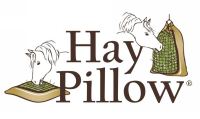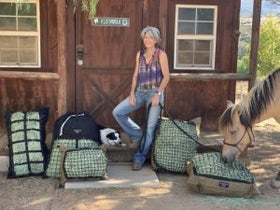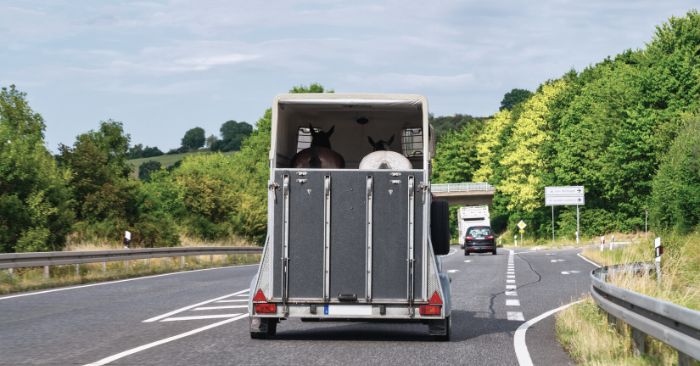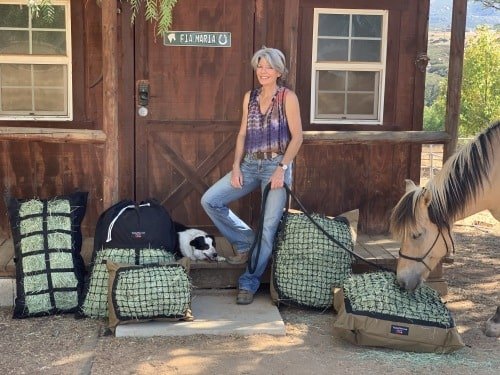Why You Shouldn't Transport Horses on an Empty Stomach
Considering a horse's natural instincts, transport is inherently stressful. Add to that lack of forage - or lack of access to forage if your hay ends up on the floor - and you've combined two common causes of gastric ulcers. Very alarming - considering ulcers can occur in as little as 24 hours.
Thankfully, you can be proactive by providing forage (hay, pasture or soaked hay pellets) 1) prior to departing, 2) during transport and 3) once you arrive at your destination. Read on to learn why forage (not grain or sweet feed) is crucial for all three scenarios.
Important Exception - if you’ve been instructed to withhold feed due to a medical condition, by all means do so!

Why Transport is Stressful
Suffice it to say that if your horse is transported, he or she is stressed internally to some degree. Some may exhibit stress outwardly by refusing to load, pawing once in the trailer, whinnying or kicking the walls. Horses rarely do anything that doesn’t have a purpose.They don’t have the mental capacity to ponder and carry out acts intended to be annoying. It is our responsibility as their guardians to reduce their stress level mentally and physically to the best of our ability.
Why Feeding Forage Prior to Departure is Beneficial
By the time you load into the trailer, your horse's stomach pH will be lowered. Loading with an empty stomach allows accumulated gastric acid (unbuffered due to lack of saliva from chewing) to slosh and bathe its lining. The fiber that forage provides creates a mat of sorts, which prevents acid from splashing in the stomach.
Why Forage During Transport is Optimum
Chewing on forage produces saliva, which buffers the gastric acid, and relaxes the jaw. Tension in the jaw can radiate throughout the body. Mental and physical experiences are synonymous in that each has an influence on the other and both can induce ulcers.
The act of foraging during transport can also reduce mental stress by distracting the individual from focusing on the impairment of their natural instincts and redirecting their attention to food.
Whether caused by isometric balancing or taking bumps in the road, splashing gastric acids can induce ulcer formation or exacerbate existing ulcers to the extent they create an ulcer deep enough to cause bleeding or even burn completely through the tissue. Splashing of gastric acid on ulcers would feel similar to hydrochloric acid being splashed on your face.
Why Forage Consumption is Beneficial After Unloading
Stress persists upon arrival because your horse is in an unfamiliar setting with a heightened sense of survival instincts engaged. Whether tied outside your trailer, placed in a corral or stall in a strange environment or put into exercise immediately - your horse is experiencing many stressors.
The continuation of chewing and swallowing helps to:
- Maintain a lower (more alkaline) pH
- Renew a protective layer of fiber to prevent the splashing of acids
- Continue to redirect your horse's attention to food
How Slow-Fed Forage Benefits Horses During Travel
- Increasing chew time & producing more saliva
- Further reducing particle size
- Increasing saliva to forage ratio, which provides moisture and aids in digestion
Helpful Tips to Reduce Stress While Traveling
- Buddy up and take a familiar companion in the trailer.
- Ensure your horse trailer shocks provide the smoothest ride possible. Use caution when applying brakes and making turns.
- Provide clean shavings on the floor for traction and mist them with a spray nozzle to minimize dust inhalation.
- Ensure maximum ventilation.
- Provide forage to last the duration of your trip - you may need a slow feed net or bag to accomplish this.
- Stop at least every 3-4 hours to offer water and give your horses a break from balancing themselves.
Hydration Tips
- To help keep your horse hydrated during transport, drench your hay with water and let it drain prior to loading into your hay bag for the trailer.
- Take water from home and offer along the way (horses that are reluctant to drink water may be even more reluctant to do so if the water tastes different).
- If you can’t take water with you, start adding something to flavor the water at home in a separate bucket (to experiment with their preferred flavor) such as peppermint extract or powdered Gatorade®. Once you discover your horse's favorite flavor, take it with you to mask the taste of unfamiliar water sources.
Monitor Your Horse Trailer Interior Temperature
Hang the sensor in a mesh bag for good air flow or mount it about halfway up the side of the wall in the trailer (as far away as possible from a warm body).
Livestock can generate quite a bit of body heat, even in cold weather. Conversely, in warmer weather it can alert you if temperatures rise to a cause of concern. This allows you to open and close air vents and windows to achieve optimum comfort with confidence for your precious cargo.
All Things Considered
Hay Pillow® Uses for All Your Travel Needs
Helpful How to Resources
- Preventing Equine Gastric Ulcers - How Forage Buffers Acid
- Equine Gastric Acid - 12 Facts You May Not Know
- Causes of Equine Ulcers – 7 Stress Factors & Solutions
- 9 Benefits of Slow Feeding Horses
- 7 Slow Feed Dos and Dont's for Horses
- Never Exercise Horses on an Empty Stomach...Ever
- Sand Colic - The Surprising (Simple) Cure & Prevention
- How to Introduce & Incorporate Free-Choice Forage: A Detailed Action Plan
- 7 Easy Ways to Help Prevent Colic
- Keeping Horses Warm Naturally – Internally and Externally
- Why Most Horses Prefer to Eat Outside
References
- Briggs, K. (2003, April 1). Exercise and Ulcers: Is it the Norm?. https://thehorse.com/151421/exercise-and-ulcers-is-it-the-norm/






